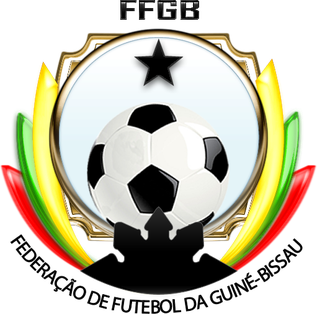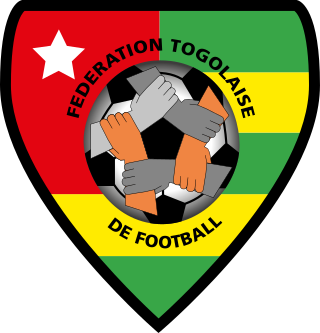
The Tunisia national football team represents Tunisia in men's international association football. The team is a member of both FIFA and CAF, the Confederation of African Football. It is governed by the Tunisian Football Federation, founded in 1957. Colloquially known as the Eagles of Carthage, the team's colours are red and white, and the bald eagle is its symbol. Most of Tunisia's home matches are played at the Hammadi Agrebi Stadium in Radès since 2001.

The Mali national football team represents Mali in men's international football and is governed by the Malian Football Federation. The team's nickname is Les Aigles. They represent both FIFA and the Confederation of African Football (CAF).

The Guinea national football team represents Guinea in men's international football and it is controlled by the Guinean Football Federation. They have never qualified for the FIFA World Cup finals, and their best finish in the Africa Cup of Nations was runners-up in 1976. The team reached the quarter-finals in four recent tournaments. The team represents both FIFA and Confederation of African Football (CAF).

The Ethiopia national football team, nicknamed Walia, after the Walia ibex, represents Ethiopia in men's international football and is controlled by the Ethiopian Football Federation, the governing body for football in Ethiopia. The team has been representing Ethiopia in regional, continental, and international competitions since its founding in 1943. The Walias play their home games at Addis Ababa Stadium located in the capital city of Addis Ababa. They are currently ranked 150th in the world according to the FIFA World Rankings and 44th in CAF.

The Central African Republic national football team, nicknamed Les Fauves, is the national team of the Central African Republic and is controlled by the Central African Football Federation. They are a member of CAF. Despite being traditionally one of the weakest teams in Africa and the world, they recently achieved success. They won the 2009 CEMAC Cup by beating Gabon in the semi-finals and Equatorial Guinea in the final 3–0. Their FIFA ranking rose from 202nd in August 2010 to 89th by July 2011. On 10 October 2010, they earned a shock 2012 Africa Cup of Nations qualifier win at home against Algeria 2–0, which put them top of their qualification group. The team won its first FIFA World Cup qualifier on 2 June 2012 after beating Botswana 2–0 at home.

The Senegalese Football Federation is the governing body of football in Senegal. It is based in the capital of Senegal, Dakar, and was founded in 1960. The FSF aided in the development of football in Senegal, specifically for its professional and amateur leagues, youth and women's football and academies. Currently the FSF oversees the professional leagues, run by the Ligue Sénégalaise de Football Professionnel (LSFP) and fully organises the national teams, youth, women's and amateur football and all football administration.

The Spain women's national football team, officially known as the Spanish national football team has represented Spain in international women's football competitions since 1980. It is governed by the Royal Spanish Football Federation, the governing body for football in Spain.
The Croatia national under-17 football team represents Croatia in international football matches for players 17 or under. It is governed by the Croatian Football Federation, the governing body for football in Croatia. It is a member of UEFA in Europe and FIFA in global competitions. The team's colours reference two national symbols: the Croatian checkerboard and the country's tricolour. They are colloquially referred to as the Mali vatreni. So far, the Mali vatreni qualified for nine UEFA European Under-17 Championships. Croatia's greatest success in the tournament was third place in 2001. The team also finished fourth in 2005. Croatia also participated in three FIFA U-17 World Cups since its independence, in 2001, 2013 and 2015, being eliminated in quarter-finals in 2015, its biggest success so far in this tournament.

Football is a sport with a comparatively brief history in Bhutan, having had an initial period of favour in the mid-twentieth century, when it was first introduced to the country by visiting teachers from India and Europe. It has only achieved significantly renewed popularity in the early 2000s, following the advent of satellite television broadcasting, with historically national sport being archery. Consequently, the domestic game was underdeveloped. After the establishment of an initial league in the late 1980s, little in the way of recorded competition took place until the mid-1990s when a formal championship, the A-Division, was created. Football became the most popular sport in Bhutan.

The Gambia women's national football team represents the Gambia in international women's football. It is governed by the Gambia Football Federation. As of December 2019, it has only competed in one major international competition, the 2018 Africa Women Cup of Nations qualification. The Gambia has two youth teams, an under-17 side that has competed in FIFA U-17 Women's World Cup qualifiers, and an under-19 side that withdrew from regional qualifiers for an under-19 World Cup. The development of a national team faces challenges similar to those across Africa, although the national football association has four staff members focusing on women's football.

The Guinea-Bissau women's national football team represents Guinea-Bissau in international women's football. It is governed by the Football Federation of Guinea-Bissau. It has played in two FIFA-recognised matches, both in 2006 against Guinea. The country also has a national under-17 side which participated in the 2012 Confederation of African Football qualifiers for the FIFA U-17 Women's World Cup. Football is the most popular women's sport in the country. A women's football programme was established in 2004, followed by the creation of a women's national league.

The Ivory Coast women's national football team represents Ivory Coast in international women's football and is controlled by the Ivorian Football Federation. They played their first international match in 1988. The team is currently ranked 64th in the FIFA Women's World Rankings and as the 6th best team in CAF.

The Kenya women's national football team represents Kenya in women's football and is controlled by the Football Kenya Federation.
The Liberia women's national football team represents Liberia in international women's football. It is governed by the Liberia Football Association. It has played in five FIFA recognized matches.

The Rwanda women's national football team represents Rwanda in women's association football and is controlled by the Rwandese Association Football Federation. It had to date been scheduled to compete in one major tournament, the inaugural Women's Challenge Cup held in Zanzibar in October 2007, but the event was ultimately canceled. It has finally debuted in February 2014 against Kenya. The team is nicknamed The She-Amavubi.
The São Tomé and Príncipe women's national football team represents São Tomé and Príncipe in international women's football. It is governed by the São Toméan Football Federation. It has played in six FIFA recognised matches and has never been internationally ranked by FIFA. The country also has a national under-19 team.
The Sierra Leone women's national football team is governed by the Sierra Leone Football Association.

The Togo women's national football team represents Togo in international women's football since 2006. It is governed by the Togolese Football Federation (FTF), the governing body of football in Togo. The team has played five FIFA-recognised matches, in 2006 and 2007, before reappearing in the 2018 WAFU Women's Cup, set in Abidjan, Ivory Coast. Their manager since January 2018 is Kaï Tomety. Togo's home stadium is the Stade de Kégué, located in Lomé.
Zambia women's national under-17 football team, nicknamed the Junior She-polopolo, represents the country in international under-17 matches. The team has participated in FIFA sanctioned events, including U-17 World Cup qualifiers.
The Kenya women's national under-20 football team represents Kenya at an under-20 level in women's football and is controlled by the Football Kenya Federation.














